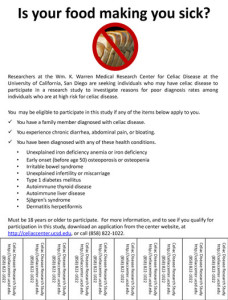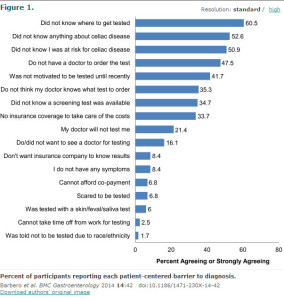With 85% of people with celiac disease being undiagnosed*, I will admit, have been relatively quick to blame doctors for not seeking out celiac disease as a possible root to what is ailing their patients. While there is some truth to it (we’ll mention it later in this article), new research says there are significant patient barriers for getting celiac tests done.
Doctors at the University of California – San Diego and a nutritionist research consultant from Harvard looked into what might cause a patient to not get a basic celiac blood screening. The study was published in BMC Gastroenterology last month.
Researchers acquired patients by posting flyers at health clinics, grocery stores and via the internet. The flyers said the UCSD doctors were “seeking individuals who may have celiac disease to participate in a research study to investigate reasons for poor diagnosis rates among individuals who are at high risk for celiac disease.”
They found 119 people who had at least one of the qualifying risk factors (including diarrhea, diagnosed IBS, autoimmune thyroid disease (see full list) and one of the qualifying potential barriers (like “did not know about celiac disease before this study”, “I do not have a physician”, “I don’t have insurance”, etc. See full list).
Patient barriers for getting tested for celiac
Top overall barriers for patients/participants were:
- Did not know where to get tested for celiac. 60.5% Strongly agreed or agreed with this statement.
- Did not know anything about celiac disease until recently. 52.6% Strongly agreed or agreed with this statement.
- Did not know they were at risk for celiac disease before learning of the study. Just over 50% agreed and strongly agreed with this
- Did not have a doctor to perform the test. 47.5% strongly agreed or agreed with this
- “I was not motivated to get the test until recently“. 41.7% Strongly agreed or agreed with this statement.
But there are some interesting answers when you break down the demographics (see all demographic responses here).
These groups said their top barrier was that they didn’t know where to get tested.
- Age: All age groups
- Sex: Females
- Income: People who made between $25,000- $50,000
- Education: People who had some college through a 4-year-degree
- Ethnicity: Whites-non-Hispanic
- Employment status: Unemployed (included: unemployed able to work, unemployed not able to work, retirees, homemakers, students, and non-paid volunteers)
Two demographics said they didn’t know they were at risk for celiac disease: those who made between $50,000-$100,000 and folks who were Hispanic or of another ethnicity.
Employed folks cited their top barrier for not getting tested is that they didn’t know about celiac disease until recently, followed by not knowing where to to get tested and not knowing they might be at risk.
The category of “I was not motivated to get the test until recently” was the most common barrier for people who made more than $100,000.
There were some interesting correlations found between the answers. People who didn’t know about celiac, were also likely to answer that didn’t know they were at risk. People who didn’t have insurance were also likely to answer they didn’t have a doctor to perform the test. Finally, people who said they didn’t know about the screening test also were more likely to answer that they didn’t know where to get tested.
The Conclusion:
In the end, of the 119 participants 3 had a positive IgA tTG test, which equates to 2.5%. They identified themselves as white, non-Hispanic. Two of the three said they had a first-degree relative with celiac.
Because so many people in the study didn’t know about celiac disease, the risk factors and how to get tested, researchers feel future public awareness campaigns are in order. Because of lack of awareness, these patients would also be less likely to ask for celiac testing from their physicians.
As for my general presumption that doctors just aren’t looking for celiac. The report shows participants didn’t have much confidence in their physicians regarding celiac testing either, “more than a third of participants did not think their doctor would know which test to order,” the study said. Researchers concluded, with the assistance of a previous 2005 study, that greater education of health care professionals would be helpful.
So anything you can do to raise awareness would be great! Join your local celiac support group or raise awareness with a local fundraiser walk! And feel free to share this article!
Tags: barriers, blood, celiac, diagnosis, disease, gluten-free, risk, serology, testing, tests





April 5th, 2014 at 8:41 am
The reason I don’t get tested, is because I am massively afraid of the reaction I will have while eating Gluten, IN ORDER to get tested. I wish there were another way to find out how sensitive one reacts, without having to ingest this crap into my body!
April 8th, 2014 at 7:14 pm
It took me so long to get diagnosed because I asked for the test by name and was turned down by my doctor.